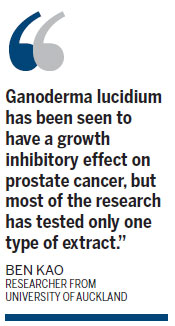Traditional Asian remedy found to fight prostate cancer
By Xinhua in Wellington, New Zealand (China Daily) Updated: 2014-05-23 07:10
A widely used traditional Asian health food supplement can actually help to inhibit the growth of prostate cancer cells, depending on its production process, according to New Zealand research released on Thursday.
University of Auckland researcher Ben Kao compared the impact of different ethanol and water-based extracts of the Ganoderma lucidium genus of mushrooms on cell lines of prostate cancer and identified how the compound killed cancer cells and reduced inflammation.
Ganoderma mushrooms, which grow on wood, include about 80 species and are often referred to as shelf mushrooms or bracket fungi.
Known as "lingzhi" in China and "reishi" in Japan, they are widely available in Asian countries and have been used for millennia in Chinese medicine to promote good health.

Available in Asia in a variety of forms and strengths, from low-strength pills to high-quality red mushroom extract, they are believed to boost the immune system, improve circulation, reduce cholesterol, lower blood pressure, destroy tumors and slow aging.
"Ganoderma lucidium has been seen to have a growth inhibitory effect on prostate cancer, but most of the research has tested only one type of extract," Kao said in a statement.
"For this study we compared four different extraction methods to see which is the most powerful and to see how it exerts its effects."
Two extracts were made using ethanol based extraction and two used water-based extraction methods.
"The ethanol-based extracts had the more direct effect on cancer cell growth by inhibiting the cell cycle and were more powerful than water-based extracts," said Kao.
"For the water-based extracts, the mechanism of action involved the immune and anti-inflammatory pathways within the cell."
The Ganoderma lucidium was shown to have a strong effect on limiting cell growth in the cancer cell lines and no negative effect on normal cell lines.
(China Daily 05/23/2014 page10)










